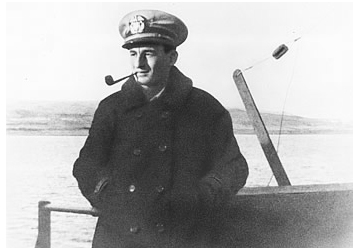|
|
|
Rosario S. Puleo |
|
|

After graduating high school at the height of the depression in 1937, I held a job as an electrician in the Garment District of New York City. Later on I got interested in radio theory and amateur radio and enrolled in an evening course in radio theory at a Brooklyn high school; I taught myself Morse code by converting everything I read into ditz and dashes. One day while buying radio parts at a radio store, as fate would have it, I missed the elevator going down. While waiting for the next elevator I wandered over to the book section of the store and spotted the June 1941 issue of QST magazine. I bought it because the cover indicated that it had articles about amateur radio. I had never heard of the magazine and would not have bought it had I not missed the elevator. As all Gallups Islanders know, this particular issue of “QST” contained the article about Gallups that induced many of us to apply for admission to the school. I showed the article to my evening class instructor asking him if he thought I would be qualified. He wrote a glowing report about me to the United States Maritime Service and as a result I was accepted. I was never away from home before. My first morning at Gallups, being awakened by the shrill bugle call, and surrounded by strangers, was a traumatic experience I will never forget. I was brought up in an Italian ethnic community, but now being thrown in with boys from all parts of the United States, who for the most part were better educated, was very intimidating. Most of the students were radio amateurs with a good knowledge of radio theory and code, and some had electrical engineering college credits. It was July of 1941 and the United States had not entered the war yet, therefore there was no immediate need for Radio Officers. We were told that the course would run for a full year, with exams every Saturday morning. It was a competitive situation, and those not making the grade would flunk out. In the beginning I studied constantly, but after about four months I gained enough knowledge and confidence to compete comfortably with those of us who survived. Because of the training, the FCC exam was a snap; I even got the First Class Radiotelephone and a First Class Radio Telegraph license without even studying for it. After graduating in July of 1942, my first assignment was to join a freighter in Philadelphia, the SS Pennsylvanian. When I came aboard, the Radio Officer was already packed; he shook my hand, wished me luck and left immediately. I had never been aboard such a large ship. Again, because of the intensive training at Gallups, I was able to figure out quickly how all the equipment worked. We set sail within a few hours after my arrival on the ship. I was fully aware of all the ships being sunk off the Atlantic coast, and I expected the worst. I immediately put on my life jacket, and prepared to send an SOS. Going to sleep that night was out of the question; I sat and waited for a torpedo to hit. After awhile I fell asleep in my chair. To my surprise I awoke the next morning to find we were still afloat. As I was never out of sight of land before, it was a strange feeling being out in the middle of the ocean. The next day we entered New York Harbor where they made repairs and loaded cargo. A mate who was leaving the ship took me aside and advised me to try to be reassigned to another ship as my ship was loading cargo for the deadly Murmansk Run. But I decided to stay with the ship because no trip was safe. Again as fate would have it, the Navy stopped all shipping to Murmansk because of extremely heavy losses. Instead we were sent to the Persian Gulf via South Africa where we encountered submarine wolf packs operating out of Capetown. Our cargo was unloaded in Persia (now Iran) and transported overland to Russia. Subsequent trips on Liberty Ships took me to many countries around the world in which we participated in the invasions of North Africa, Sicily, France and the Pacific Islands. I also made the Russian Murmansk Run in which our small convoy was used to lure out the German battleship Scharnhorst which was sunk by the British Navy. I had my fair share of submarine attacks and dive bombings but, as fate would have it, I survived the war. After the war I married, had two children, and worked for Pan American Airlines, as a Radio Technician, then Instructor and later as head of the Radio Training School. I left after about 3 years for a higher paying job with ITT as a supervisor of their Point to Point radio transmitting facility on Long Island. I later left this job for a position with the U.S. Airforce as Electronic Specialist for the New York Air Procurement Region. I attended Hofstra University evenings and graduated with a degree in electrical engineering. I then founded Puleo Electronic manufacturing company. |